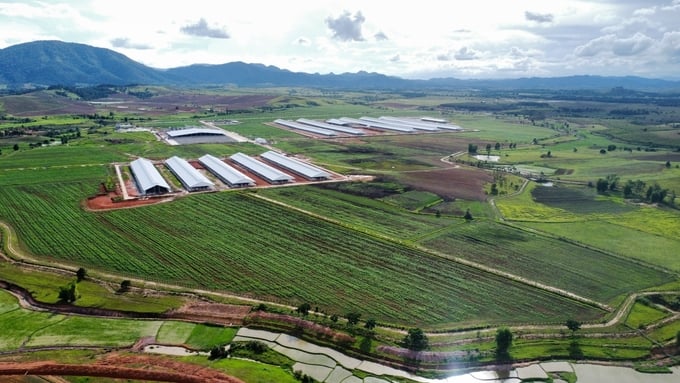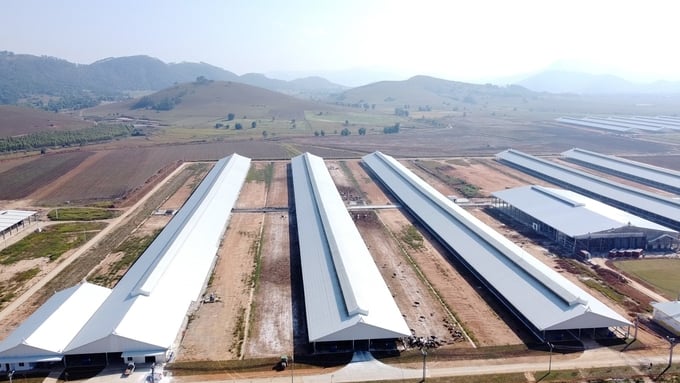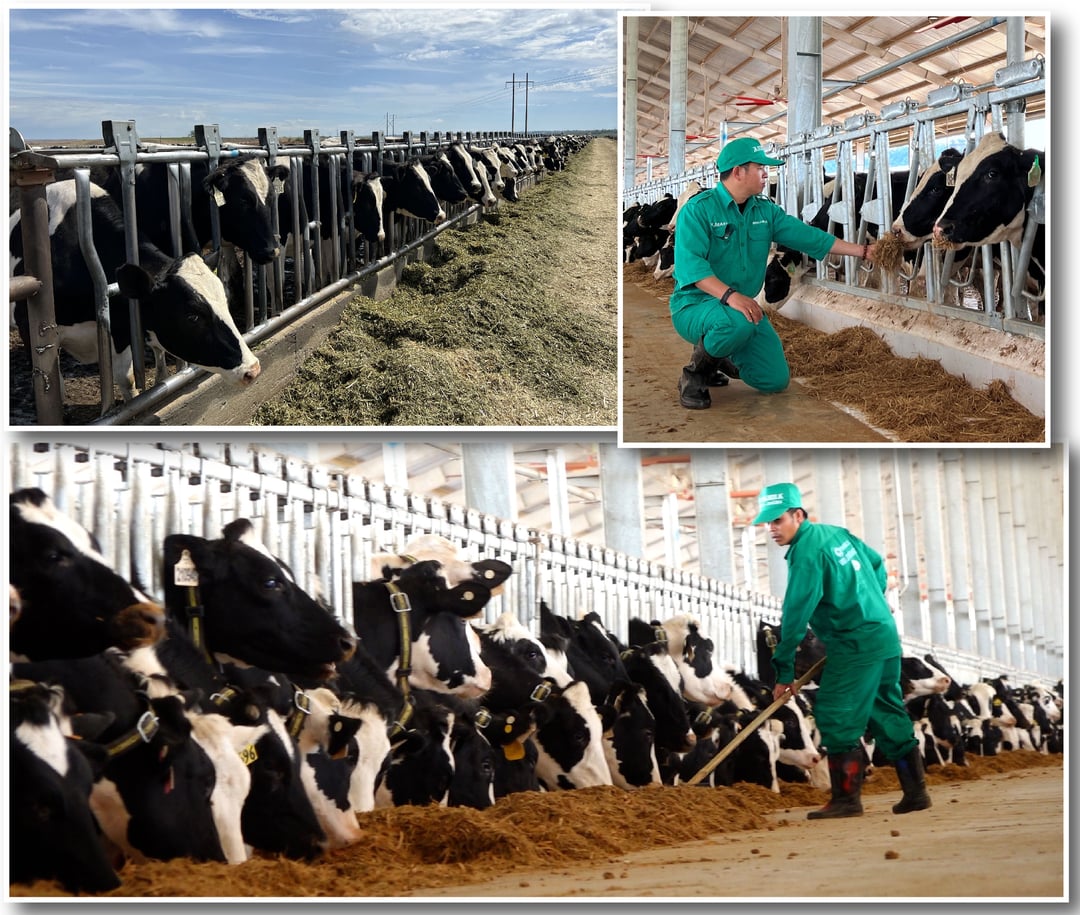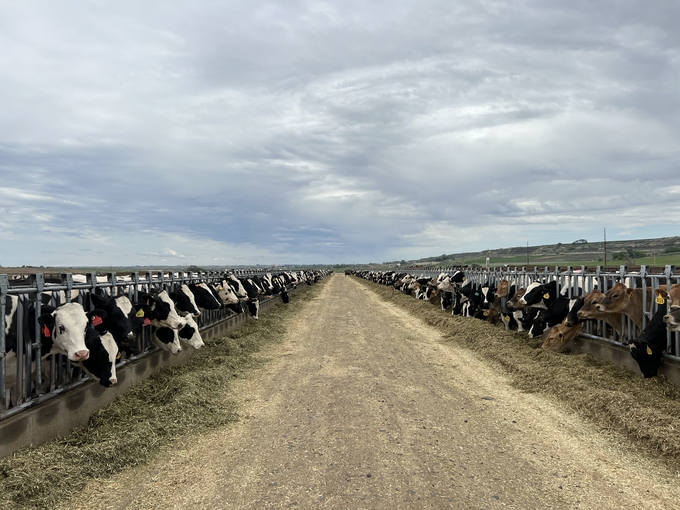June 16, 2025 | 21:13 GMT +7
June 16, 2025 | 21:13 GMT +7
Hotline: 0913.378.918
June 16, 2025 | 21:13 GMT +7
Hotline: 0913.378.918
Introduction:
In order to find out how the countries downstream of the Mekong River are facing the problem of climate change and how they adapt to develop, at the end of October 2022, Vietnam Agriculture News organized a film crew and made their way to Laos and Cambodia. This series is an honest record of the nearly one month we went outside to make films.

Xiangkhouang Plateau. Photo: Quang Dung.
In the Lao language, Xiangkhouang means “the land on the horizon”. Xiangkhouang plateau has a natural area of 15,800 km2 with more than 90% being hills and mountains and an average temperature of 22oC. The land and climate here are considered to be very suitable for agricultural development, but the province's total herd of cows is only 243,000 heads, the buffalo herd has more than 50,000 heads. The planting area of Kay Noi sticky rice, which is a Xiangkhouang specialty, is only 12,500 ha.
To Somsamone Phalichanh, Deputy Director in charge of the Xieng Khoang Department of Agriculture and Forestry, agricultural development in Xiangkhouang is not up to par with the great potential and advantages. Xiangkhouang’s biggest success so far has been to invite Vietnam Dairy Products Joint Stock Company (Vinamilk) to invest in the dairy project Vinamilk Laos - Jagro. It is not only the largest and most modern dairy farming complex in Laos but also the number one in Southeast Asia.
According to Ha Trong Dung, Deputy General Director cum Director of Vinamilk Laos - Jagro dairy farm, the goal of this collaboration is clear: Turn the Vinamilk Laos - Jagro dairy cow complex into a new symbol of the friendship between the two countries.
After a period of research and survey, in 2019 the Vinamilk Laos - Jagro project was officially started, followed by the establishment of Lao-Jagro Development Xiengkhouang Co., Ltd. The project is divided into two phases with a total investment of approximately USD 500 million on an estimated area of 20,000 ha. The project has invested more than USD 120 million in Phase I and is completing the final works on an area of 5,000 ha with a scale of 24,000 dairy cows. The incoming Phase II will also be constructed to meet the scale of approximately 100,000 dairy cows on an area of 15,000 - 20,000 ha.

From the company office, we had to move to the dairy farming area by car, although both of these places are located on the project site.
Sengphet Phetdara, a local Laotian who is the Director of Agriculture and Land of Vinamilk Laos - Jagro said, “a few years ago this whole area was still a wasteland. No one dared to come close to these areas for fear of getting caught in landmines. Although many international experts in the field of agriculture, when coming to Xiangkhouang said that the land and climate here were not inferior to New Zealand's dairy paradise, however, what to do to awaken Xiangkhouang’s advantage and potential is really not a simple matter.”
But now, after three years since the start of the project, all the main items of the project have been completed. This includes a system of milking barns with a scale of 4,000 cows, a milking house which can milk 120 cows at the same time, the latest and most modern milking Rotary machine applied in dairy farming technology. Vinamilk Laos – Jagro also possesses a health monitoring system which apply the most modern machinery like the Center-pivot irrigation system as well as machinery and equipment to ensure the cultivation chain of grass, corn, oat areas of 30-35 ha/day.
July 2022 might be considered a major event of the project since Vinamilk successfully received 1,000 purebred HF dairy cows imported directly from the USA to Nghi Son Port (Thanh Hoa), then "crossing the border” by road through Nam Can international border gate to Vinamilk Laos - Jagro farm. This is a purebred HF dairy herd, which has been carefully selected by genetic experts through three generations of pedigree with heifers aged from 9 to 13 months. Each cow is examined and evaluated for a high level of total genetic performance. Selected cows in the herd have an average yield of over 10,000 liters/head/cycle of 305 days, equivalent to 38-40 liters of milk per day.
The complex now has a scale of more than 8,000 cows and milk output of up to nearly 44,000 tons/year. All of the cows have code and barcode, just scanning on the computer or phone and the "genealogy" of several generations of cows will appear on the screen. Watering, feeding, and cleaning the barn are also automatic. Anyone entering or leaving the barn has to disinfect, even leaders of countries when coming here must comply.
Such strictness is understandable. Because to get the results today, those who work on the project have had to go through so many hardships. There is no room for negligence, not to mention Vinamilk's ambition with this project is not just on the economic side. Investing in the construction of the Lao-Jagro dairy farm complex is part of Vinamilk's long-term strategy of developing fresh milk material areas both at home and abroad to meet the increasing consumer demand.

Ha Trong Dung said, “The technology and equipment in Vinamilk Laos - Jagro project is the most modern compared to the system of 13 dairy farms in Vietnam that Vinamilk has built over the past 15 years. High technologies help the farm overcome the difficulties of climate change. The irrigation system, when put into operation, has solved the problem of water shortage in the dry season in Xiangkhouang.”
And for Sengphet Phetdara, it was gratitude. Vinamilk Laos - Jagro project was built not only with the characteristics of Laos’ natural soil and climate in mind, but it also created jobs for people, showing support by coordinating to purchase corn kernels for farmers, combining training and development of high expertise personnel in agriculture. With this cooperation model, Lao people will have the opportunity to participate in the value chain from input areas to production factories.

“Impact the community where the project is implemented is Vinamilk’s priority for sustainable development, and we are grateful for that,” said Sengphet Phetdara.
Perhaps, the day Xiangkhouang becomes the dairy center of Southeast Asia is very near. Vinamilk also informs that in addition to their invested and owned factories in the USA, Cambodia, Vinamilk, New Zealand and subsidiaries in Poland, this company has also conducted surveys and considered investing in Southeast Asian countries such as the Philippines, Indonesia, and Myanmar. These will be the footprints to gradually realize the goal of bringing the Vietnamese dairy brand to the world.
Translated by Samuel Pham
/2025/06/12/3721-2-202745_83.jpg)
(VAN) TH made an impression at Seoul Food 2025 with its line of natural beverages, paving the way for Vietnamese food products to enter the South Korean market.

(VAN) Soc Trang's success in rice exports stems from a strategy of developing fragrant and specialty rice cultivation areas and standardizing production toward low-emission practices.
/2025/06/11/1311-5-120811_839.jpg)
(VAN) The pig farming industry is facing the challenge of comprehensive restructuring to meet requirements for quality, safety, traceability, and market expansion both domestically and for export.

(VAN) Vietnam considers participating in ALGROALBA in order to expand agricultural production, coordinate the assessment and effective exploitation potential land.
/2025/06/05/5314-1-184727_407.jpg)
(VAN) From seemingly worthless fish scales and skin, enzymes and lactic ferments can transform by-products into peptides, opening a sustainable, effective business direction and elevating Vietnamese seafood.

(VAN) TTC AgriS and IFC signed a strategic partnership to develop a sustainable agricultural value chain, aiming to achieve the Net Zero target by 2035.

(VAN) Seafood by-products are opening a new path, combining green growth and technological innovation to enhance the industry's value.